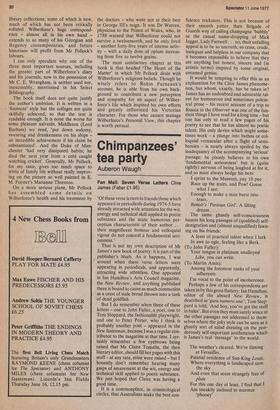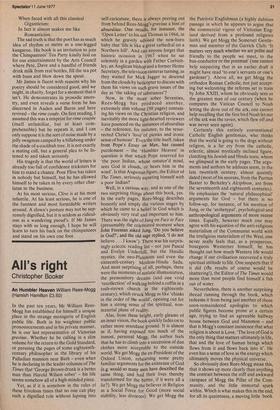Chimpanzees' tea party
Auberon Waugh
Fan Mall: Seven Verse Letters Clive James (Faber VI .95)
'Of these verse letters to friends those which appeared in periodicals during 1974-5 have already attracted wide attention for the wit, energy and technical skill applied to poetic substance and the acute humorous perception characteristic of their author . . . their magnificent humour and colloquial vigour do not conceal a fundamental seriousness.'
That is not my own description of Mr James's new book of poetry: it is part of the publisher's blurb. As it happens, I was around when these verse letters were appearing in periodicals, and apparently, attracting wide attention. One appeared in Ian Hamilton's Arts Council magazine, the New Review, and anything published there is bound to cause as much commotion as a crust of stale bread thrown into a tank of dead goldfish.
But I do remember when three of these letters — one to John Fuller, a poet, one to Tom Stoppard, the fashionable playwright, and one to Peter Porter, who I think is probably another poet — appeared in the New Statesman, because I was a regular contributor to the magazine at that time. I certainly remember a few eyebrows being raised that Ms Claire Tomalin, the then literary editor, should fill her pages with this stuff— at any rate, mine were raised — but I honestly don't remember hearing many gasps of amazement at the wit, energy and technical skill applied to poetic substance. We just hoped that Claire was having a good time.
It is a commonplace, in criminological circles, that Australians make the best con
fidence tricksters. This is not because of their smooth patter, their Brigade of Guards way of calling champagne 'bubbly' or the casual name-dropping of Mick Jagger, Lady Fartwell . . . no, their unfailing appeal is to be so uncouth, so crass, crude, inelegant and helpless in our company that it becomes impossible to believe that they are anything but honest, sincere and (in artistic terms) inspired by some original, untamed genius.
It would be tempting to offer this as an explanation for the Clive James phenomenon, but whom, exactly, has he taken in? James has an undoubted and admirable talent for humourous and sometimes polemical prose — his recent account of a trip to Russia in the Observer was one of the funniest things I have read for a long time — but one has only to read a few pages of his poetry to see that he has almost no poetic talent. His only device which might sometimes work — a plunge into bathos or colloquial vernacular after a flight of semiheroics — is nearly always spoiled by the inadequancy of the accompanying 'serious' passage: he plainly believes in his own 'fundamental seriousness' but is (quite rightly) nervous of being laughed at for it, and so must always hedge his bets:
I sprint to the Museum, pay 10 pee Race up the stairs, and Pow! Guess what I see: Enough to make a man burst into tears.
Renoir's 'Parisian Girl'. A lilting dream . . .
The same ghastly self-consciousness haunts his long passages of (qualified) selfdenigration and (almost unqualified) fawning on his friends: A feast of practical talent when I lurk In awe to ogle, feeling like a Berk.
(To John Fuller): Your tongue is platinum unalloyed Like, you can write.
(To Martin Amis): Among the foremost ranks of your adherents I'm vocal to the point of incoherence.
Perhaps a few of his correspondents are taken in by this gross flattery: Ian Hamilton, editor of the absurd New Review, is described as 'guru numero uno'; Tom Stoppard is told, 'And boy, you've got the stuff in bales'. But even they must surely wince at the other passages not addressed to themselves where the joky style can be seen as a ghastly sort of salad dressing on the ponderously self-important aestheticism which is James's real 'message' to the world: The weather's cleared. We're filming at Versailles, Palatial residence of Sun-King Louis, Where everything is landscaped save the sky
And even that seem strangely free of pluie For this one day at least. I find that I Am sneakily inclined to murmur 'phooey' When faced with all this classical Giganticism: In fact it almost makes me like Romanticigm.
The sad truth is that the poet has as much idea of rhythm or metre as a one-legged kangaroo. His book is an invitation to join the Chimpanzees' Tea Party kindly laid on for our entertainment by the Arts Council where Pete, Dave and a handful of friends drink milk from real bottles, fill the tea pot with buns and blow down the spout.
Mr James is fluent with reasons why his poetry should be considered good, and we might, in charity, forget for a moment that it isn't. He demonstrates its prosodic ancestry, and even reveals a verse form he has discerned in Auden and Burns and here revived — the rime couee. On first reading, I assumed this was a misprint for rime coupee (itself unfamiliar, but at least comprehensible) but he repeats it, and I can only suppose it is the sort of noise made by a jolly swagman camped by a billabong under the shade of a coolibah tree. It is pot exactly a mating call, but a general plea to be listened to and taken seriously.
His tragedy is that the world of letters is already too full of confidence tricksters for him to stand a chance. Poor Flive has taken in nobody but himself, but he has allowed himself to be taken in by every other charlatan in the business.
At his most serious, Clive is at his most infantile. At his least serious, he is one of the funniest and most formidable writers around. A clown's posture may not be supremely dignified, but it is seldom as ridiculous as a wandering pseud's. If Mr James stays with us long enough, I hope he will learn to turn his back on the chimpanzees and stand on his own one foot.



































 Previous page
Previous page